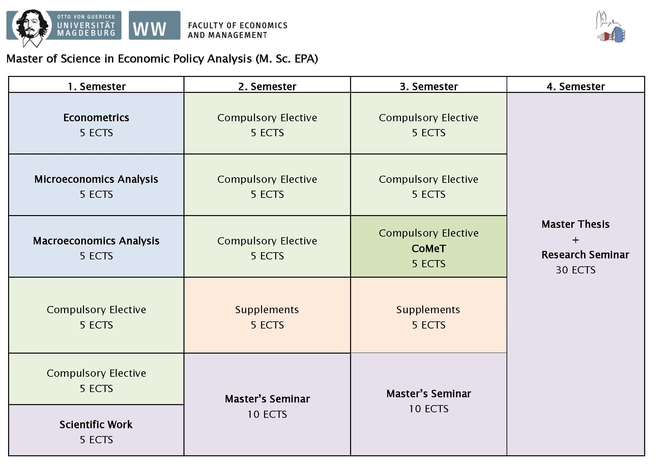Program Structure & Course Descriptions
The Economic Policy Analysis (EPA) program is a research-oriented master's which conveys the skills for students to analyze complex economic problems, issues, and policy solutions with using advanced empirical methods, analytical research skills, and theoretical models.

Compulsory Modules
In Econometrics students build upon already established knowledge of fundamental econometric methods, learn about concepts of modern microeconometric methods during lectures, and independently become acquainted with state-of-the art methodology by studying the recommended literature, are able to use STATA to work problem, and goal-oriented and analyze real world problems independently
Contents include: Regression fundamentals and identification - Instrumental Variables - Panel data - Nonstandard standard error issues - Limited dependent variables and probability models - Advanced methods like difference-in-difference and regression discontinuity design
With Microeconomic Analysis, EPA students acquire an analytical understanding of the determinants of individual decisions, develop a thorough understanding of the consequences of decentralized decision-making for individual and firm behavior in partial equilibrium models, and analyze the existence, stability and efficiency properties of general equilibria.
Contents include: Preference Relations and Utility Functions - Duality - Uncertainty - Production Technology and Profit Maximization - Cost Minimization and Cost Functions - General Equilibrium Analysis and Welfare
In the module Macroeconomic Analysis students acquire knowledge of the empirics of growth and business cycles, develop a thorough understanding of the basic models of economic growth, be able to identify the sources and amplifiers of aggregate fluctuations, and are empowered to study macroeconomic models independently and self-reliantly.
Contents include: Empirical evidence on long-run growth - Growth theory with exogenous technical progress - Long-run unemployment - Empirical evidence on business cycles - Consumption theory - Asset Pricing and investment - Monetary Policy
Compulsory Elective Modules
Previous compulsory elective modules in specialization have included:
Advanced Game Theory
Econometric Analysis of Experimental Data
Evidence-Based Policy Analysis
Experiments in Behavioral Social Policy
Financial Stability and Banking Regulation
Industrieökonomik I & II
International Trade
Introduction to Experiment Design with zTree
Methoden der experimentellen Wirtschaftsforschung
Monetary Economics
Population and Family Economics
Pricing in Global and Local Competition
Taxation and Corporate Finance
For complete overviews and module descriptions, please review the Module Handbook which is published shortly before the respective semester start.
... the description will be published soon as the module handbook is available.
Supplement Modules
Previous supplement modules have included:
Besteuerung von Umwandlungen
Bargaining, Arbitration, Mediation
Behavioral Finance
Corporate Governance, Compliance und Konzernrecht
Das Recht der Unternehmensfinanzierung und das Kapitalmarktrecht
Dezentrale Unternehmenssteuerung
Downside Risk
Experiments in Behavioral Social Policy
Financial Engineering
Foundations for Finance
Grundzüge der Abgabenordnung und des Erbschafts- und Schenkungsrechts
International Taxation
Internationale Besteuerung: Transferpreise, Wegzugs- und Hinzurechnungsbesteuerung
Introduction to Experiment Design with zTree
Investition und Finanzierung III: Engineering Economics
Modelling and Solving Optimization Problems
Pricing in Global and Local Competition
Steuerplanung, Rechtsform und Finanzierung
Sustainability and Finance
For complete overviews and module descriptions, please review the Module Handbook which will be published shortly before the respective semester start.
Master's Seminars
Previous master's seminars have included:
Applications and Implication of Behavioral Science in Management and Economics
Education Economics
Experimental Health Economics
Field Experiments
Fintechts and Digitalization of Banking
Machine Learning in Economics and Finance
Robots at Work: Economic Effects of Automation
Seminar zur Empirischen Wirtschaftsforschung
Seminar: aktuelle Herausforderungen moderner Volkswirtschaften
Seminar: Verhaltensökonomische Erklärungen von Fake News, Verschwörungstheorien und verzerrter Information
Taxation and Business Activity
The Economics of Too Big to Fail
Quality of Life in Europe: Are More Equal Societies Better?
For complete overviews and module descriptions, please review the Module Handbook of each respective semester.
Study Abroad
Although a semester abroad is not mandatory, the Faculty of Economics and Management highly recommends that students take advantage of a semester abroad at one of our many cooperation universities worldwide. Students interested in going abroad must begin the application procedure one year (two semesters) in advance (e.g. third semester abroad; consultation and application in first semester).
For a complete overview of our cooperation schools, please click here and filter your search according to faculty and study program.
For more information on different programs, such as ERASMUS, Free Mover, and WORLDWIDE, please click here.
Besides the possibility of a study-abroad semester at one of our cooperation schools, students may also do an internship abroad for one semester.
Student counseling and internship/job fair (annually in October) on campus available
For more information regarding an internship abroad, please click here.
Final Seminar & Master's Thesis
During the seminar, EPA students shall develop the ability to find and define a research project, gain insight in the planning and realization of an own research project, acquire the ability to write and present a research paper, and acquire the ability to academically discuss other students’ research.
In the course of this seminar, the students shall define and realize a research project, present the (preliminary) results of their research and write their Master’s Thesis. The thesis project may have a scientific or an applied research focus. Cooperation with firms or other organizations is possible. The module is organized as a research colloquium, where students have to present first results of their projects and discuss open questions.
For complete descriptions of these modules, review the Module Handbook of each respective semester.
Please note that module offerings may vary each semester; courses are offered at the discretion of the chairs.




